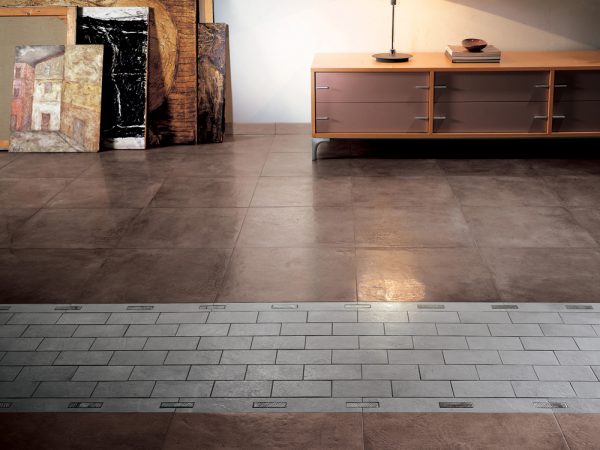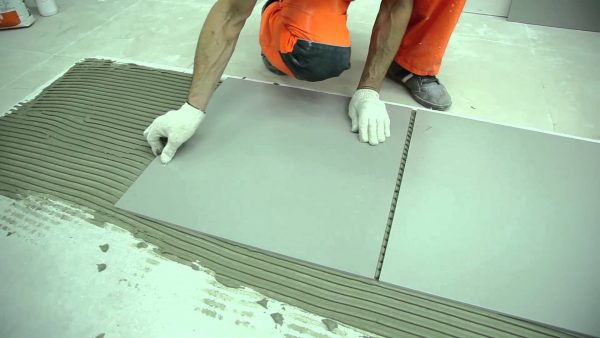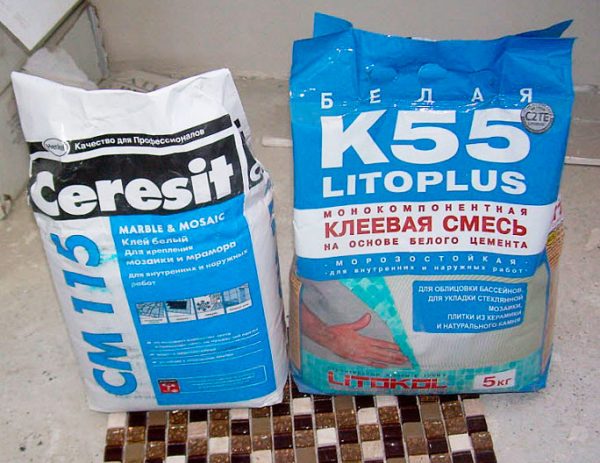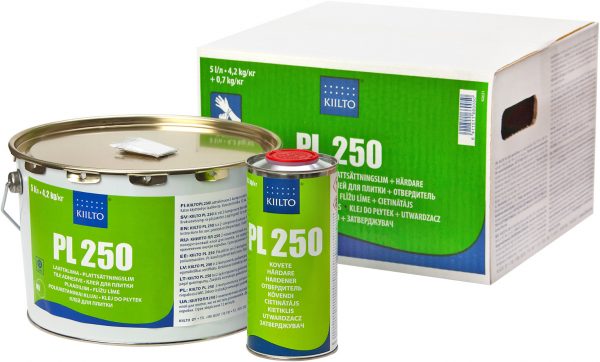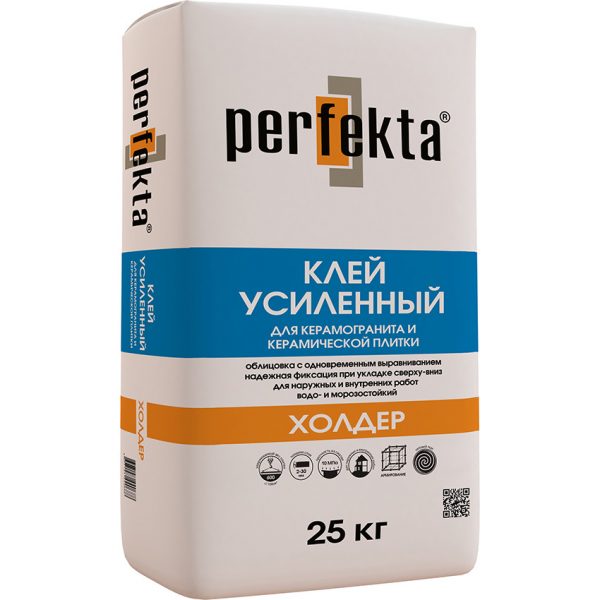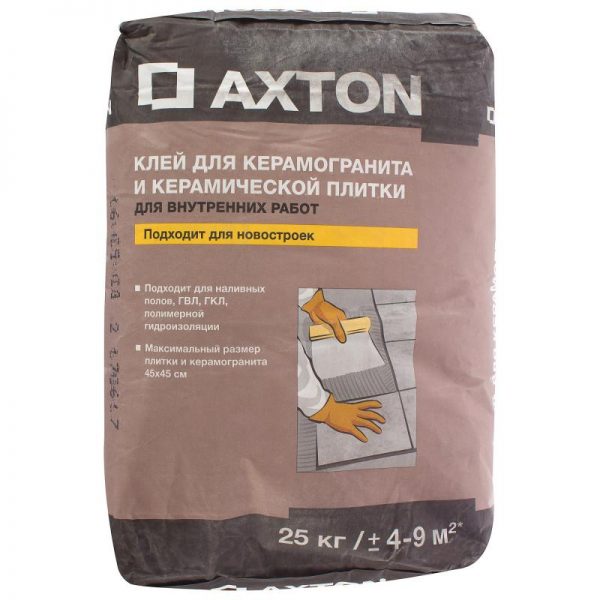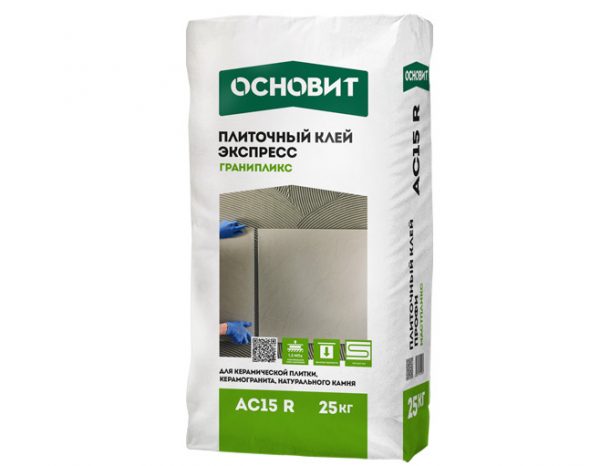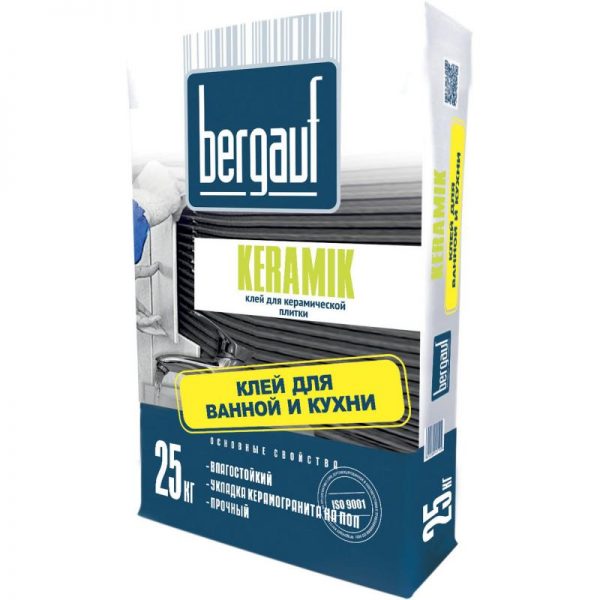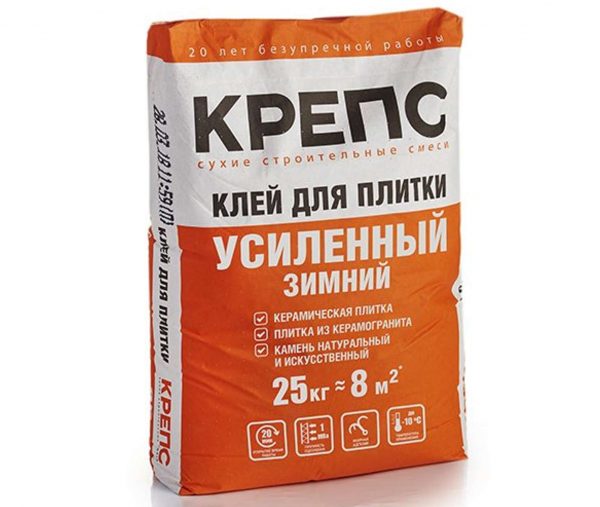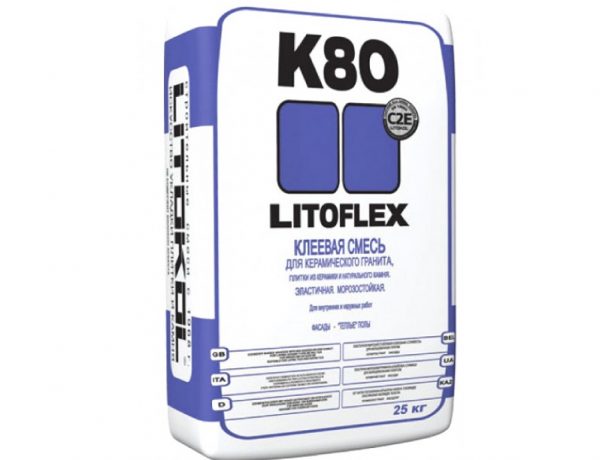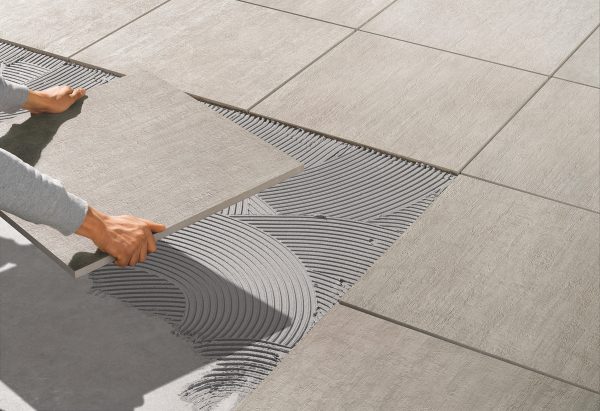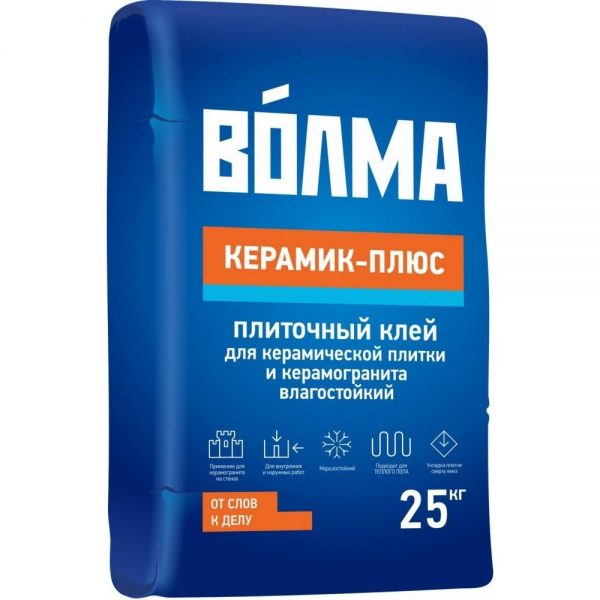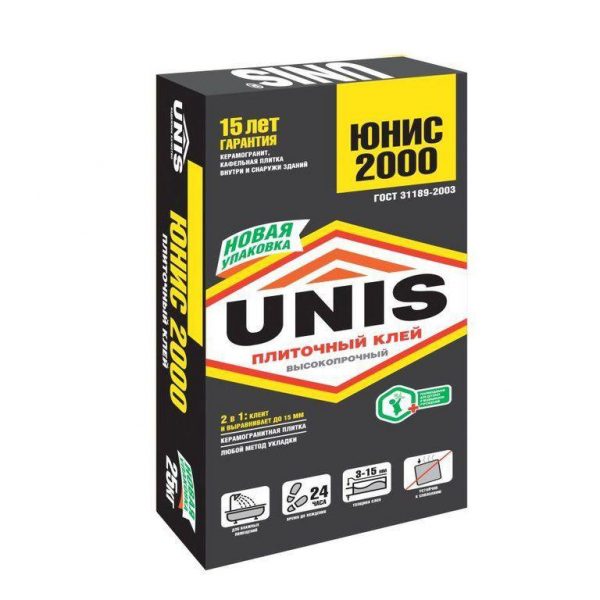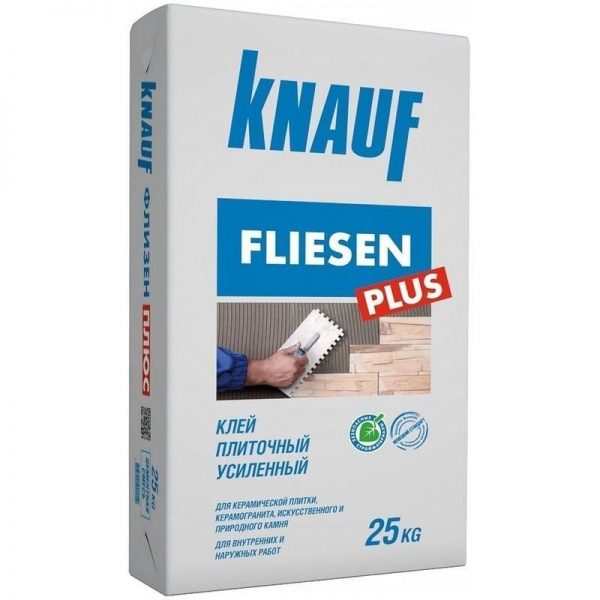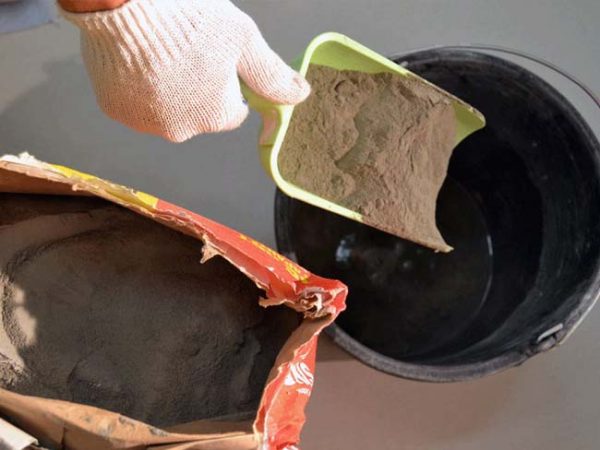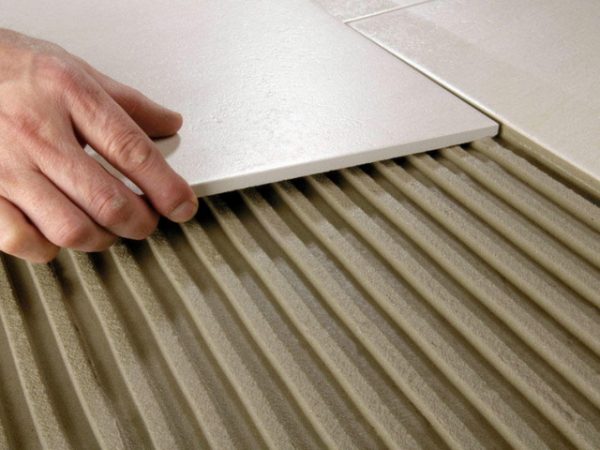Porcelain tile - a practical and beautiful material for facing, one of the best options for flooring. Its cost is quite high, but advantages overlap this disadvantage. In order to correctly and reliably lay the material, you need to choose the suitable adhesive for porcelain tile. The latter is required to support the weight of the tile, which is often large.
- Features of porcelain stoneware and the need for special glue
- What properties should glue for porcelain tiles have - a list
- Adhesive elements
- Types of glue
- For outdoor work
- For interior work
- Universal
- Quick drying
- Reinforced
- Moisture resistant
- Heat resistant
- Frost resistant
- Leveling
- Elastic and highly elastic adhesives
- Thick layer
- Which glue to choose - tips
- Selection of glue depending on the size of porcelain stoneware
- The choice of product depending on the surface to be coated
- Manufacturers rating
- Popular brands
- Volma Ceramics
- Unis Granite
- Unis 2000
- Bergauf keramik
- Ceresit CM 11
- Litoflex k80
- Knauf fliesen
- Will found Mastplix T 12
- Which brand to give preference - the choice
- The consumption of the finished mixture
- Terms of use
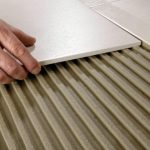
Features of porcelain stoneware and the need for special glue
Until recently, granite was used mainly in rooms with a high level of floor load: in public places, shops, shopping centers. Gradually, the material was adopted by designers of residential interiors, because it has a lot of advantages:
- excellent esthetic qualities;
- imitation of natural stone, deep color;
- super strength, resistance to mechanical, chemical damage, UV radiation;
- frost resistance, the ability to use tiles for outdoor work;
- heat resistance, ability to withstand high temperatures and even open fire.
The material is incredibly durable. It does not wear out, scratches do not appear on it, therefore porcelain stoneware is ideal for places with high traffic. Due to its non-exposure to chemical effects, it can be laid on the floor even in laboratories, workshops of industrial enterprises. The tile is very dense, does not allow moisture to pass through, is not saturated with water, therefore, over time it does not crack in humid rooms and with regular temperature changes.
The listed properties are undoubtedly the advantages of porcelain stoneware. At the same time, they necessitate the use of very reliable glue for its installation. Conventional means to hold the tile can not afford, they will lose traction and deteriorate.
to contents ↑What properties should glue for porcelain tiles have - a list
Some craftsmen try to lay porcelain tiles on a simple cement mortar. Unfortunately, ordinary cement is very different from tile adhesive. Porcelain stoneware has low porosity and a minimum coefficient of water absorption. Therefore, the liquid released from the cement is not absorbed, which causes the formation of mini-voids, separation zones.
If you use a special adhesive for porcelain tile, the effect will be completely different. For such a coating, the following adhesive properties are required:
- maximum adhesion with the base and tile;
- plastic;
- the ability to adjust the position of the tile in the near future;
- moisture resistance, frost resistance;
- environmental Safety;
- ease in work;
- suitability for external, internal works, arrangement of heat-insulated floors, facing of fireplaces (depending on type of mix).
The glue should be suitable not only for the material itself, but also match the base. So, when gluing porcelain stoneware to complex surfaces - to wood, drywall, metal - it is worth using the most reliable mixtures with polyurethane, epoxy, polyester resins. There are universal mixtures, which usually cost more, but are suitable for almost any operating conditions.
to contents ↑Adhesive elements
As in the case of cement mortar, Portland cement is present in the glue base, which is enriched with a large number of improving additives. There is fine quartz sand as a fractional filler. Modifiers are introduced into the composition depending on the formulation of a particular manufacturer, they can be up to 5% of the total mass.
Most often, such substances are used as additives:
- methyl cellulose ether - a component that is able to retain moisture, its norm determines the rate of solidification of the adhesive mixture;
- starch ether - determines the rate of deformation of the adhesive;
- polymers, resins - they determine the strength of adhesion to the base, plasticity, and lack of tendency to crack;
- various vegetable and synthetic fibers - reduce the sliding force of the tile, increase the strength of the masonry.
Types of glue
What is the best glue to choose, what types exist? The classification of adhesives for porcelain tiles is based on the properties, composition, purpose of specific solutions. By the number of components, the adhesive can be as follows:
- One component. It is a ready-made glue that does not require kneading, adding other substances, does not cause dust. It is convenient to work with glue of this type, but its price is quite high.
- Two-component. The product can be diluted with special substances or ordinary water. In any case, it is a dry powder that requires dilution immediately before use. Mixing the solution will have to be in small batches, otherwise it will deteriorate.
There are other classification of adhesives - according to their qualities and purpose.
to contents ↑For outdoor work
Porcelain tiles are often lined with balconies, loggias, verandas and terraces, and other unheated structures. Therefore, when installing it, it is important to choose a special glue that is not afraid of changing climatic conditions, temperature extremes. The product must necessarily be frost-resistant, withstand a large number of freezing and thawing cycles. Also, glue for outdoor use must have the following characteristics:
- moisture resistance - if porcelain stoneware is used outdoors, this property is very important, if it is absent, cracks and defects will quickly appear in the solution;
- the ability to withstand heavy weight - the margin of safety of porcelain stoneware is high, but weak glue can cause subsidence, detachment, shifting of tiles;
- resistance to ultraviolet radiation - this property will be required if sunlight is regularly exposed to the material during operation.
For interior work
Inside the house it is always warm, so the frost resistance of glue loses its relevance. But other parameters must be taken into account:
- In damp rooms, only moisture resistant glue should be used. Of course, tile joints in the bathroom, in the kitchen can be wiped with a special waterproof grout, but inside the glue can dampen over time. In this case, the granite will lose its adhesion to the base, and the fungus can also settle in the joints.
- In the corridor, on the stairs, in the common areas, it is important to use strong, but elastic adhesives. This is the only way to avoid damage, shrinkage, shear at constant loads.
- For fireplaces, stoves, and other heating substrates, you need to buy heat-resistant adhesives for interior use. Such funds are not afraid of regular heating and cooling. The effect can be achieved with the introduction of special plasticizers.
- Environmental friendliness.This property is one of the main when used indoors. The composition should not be asbestos and other harmful components.
Universal
Such glue can be used for laying porcelain tile inside, outside the building. Typically, such tools are not suitable for extreme conditions. Despite its versatility, with frequent, sharp fluctuations in temperature, too much moisture, adhesives can deteriorate more quickly. Also, high daily mechanical loads are not suitable for them. As a rule, universal adhesives are not suitable for large-format tiles, they fix only porcelain tiles of size less than 30 * 30 cm.
to contents ↑Quick drying
Mixtures of this type help put porcelain stoneware on non-standard surfaces, for example, stick to plywood, metal. They are resistant to moisture, temperature extremes, ultraviolet, have excellent adhesion. Introduction to the composition of the polymers provides quick drying. Usually, professionals work with such adhesives, because the possibilities for adjusting the position of porcelain stoneware are minimal.
to contents ↑Reinforced
Most often, reinforced adhesives are used for laying material on the external walls of buildings and floors in unheated rooms, where large dynamic loads are expected. Reinforced adhesives are suitable for all types of substrates, have good adhesion even to metal. Due to the presence of plasticizers, the mass fills the smallest voids, thereby increasing adhesion. Typically, the composition is polyurethane or epoxy.
to contents ↑Moisture resistant
Such adhesives have a formula specially reinforced for exposure to high humidity and even direct contact with water. They are used in baths, saunas, pools, on the porch of the house where rain falls. They are not damaged even without additional coating with hydrophobic compounds. In the bathroom, funds can also be used, but their price is usually high.
to contents ↑Heat resistant
Glue with heat-resistant properties is useful when laying porcelain tiles on stoves, fireplaces, underfloor heating. A simple solution can quickly deteriorate, and special ones include silicate and other additives, plasticizers. Depending on the type and brand, the glue can withstand up to + 120 ... + 240 degrees of heating and even higher. It is very important that the composition does not contain harmful components, because when they are heated, they will begin to evaporate vigorously.
to contents ↑Frost resistant
Adhesive with frost-resistant properties is useful when gluing tiles on building facades, for cladding plinths, porches, walls in dressing rooms, on balconies, terraces, and other unheated rooms. Usually there is an “F” mark on the product’s packaging, which indicates frost resistance. A number is always indicated next to this sign - it reflects the number of possible freezing and thawing cycles of the composition. You can safely take adhesives with the number 50 - they will last a very long time without complaints.
to contents ↑Leveling
If the floor in the room has large differences, uneven, a cement screed is used. But with minor defects, you can do with laying granite on leveling adhesives. They can also partially align the facade of the building, the walls inside the rooms, a basement, a balcony. This property is achieved due to good fluidity and the ability to "hide" the deficiencies of the base.
Elastic and highly elastic adhesives
Such adhesives will be required for the arrangement of underfloor heating, heated walls. Due to their high elasticity, they prevent cracking of the adhesive joint and spoilage of the granite itself. Moisture-resistant highly elastic adhesives are used for swimming pools.
to contents ↑Thick layer
For large-format tiles that are laid on the floor, you need to apply a layer of glue of an increased thickness. In order to prevent a 1-1.5 cm layer from cracking, special thick-layer adhesives are used. If the tile is to be laid outside, the product must additionally have frost resistance.
Which glue to choose - tips
To choose the most suitable glue, you need to consider many factors.Usually, after dilution, the solutions remain suitable for work for 1-8 hours, for beginners it is better to buy that glue that retains its properties longer. When laying porcelain tiles inside buildings at temperatures above +15 degrees, you can also buy long-drying adhesives. In contrast, the exterior of buildings requires the use of quick-drying adhesives.
to contents ↑Selection of glue depending on the size of porcelain stoneware
According to experienced masters, the thickness of the adhesive layer and the tile itself should be approximately equal, but with an increase in the size of porcelain stoneware, it is necessary to add an adhesive consumption of 1 m2. Now on sale there is a tile measuring 5 * 5 cm, 10 * 10 cm - such small elements can be laid on any tile adhesive. But the weak point in such masonry is precisely the seams, they deteriorate faster than the granite itself, so you should pay close attention to the quality of the glue.
Dimensional plates (300 * 300, 600 * 600) are laid only on adhesives with maximum fixing properties. Otherwise, the product will not hold so much massive structure, especially when it is sticker on the wall. Universal adhesives are useful where large-format porcelain tiles are laid on the floor, which is not exposed to significant loads.
to contents ↑The choice of product depending on the surface to be coated
For heated floors, adhesives with increased elasticity are chosen. Otherwise, the tool will not be able to align the pairing of the base with temperature differences, which occurs regularly. This will cause the adhesive to shrink, cracking the seams. In any case, the installation of porcelain stoneware must be done on a cold floor, and connect the system only after the adhesive has completely dried.
Frost resistance is important when facing buildings, structures, paths that will be exposed to cold temperatures. Without sufficient resistance to frost and thawing, glue will crack after the first winter season.
For simple surfaces, you can buy universal adhesives or products without enhanced adhesion - up to 0.2-0.5 MPa. Simple bases include those made of concrete (standard and cellular), brick, screed (hard surfaces, not subject to deformation). For complex substrates, only adhesives with adhesion from 1 MPa are used; these include:
- glass;
- plastic;
- tree;
- drywall.
to contents ↑When laying porcelain tiles on OSB, ready-made one-component adhesives with a minimum moisture content are used. Dry mixtures diluted with water must not be used. For the kitchen, you should buy moisture-resistant or universal compounds, for the bathroom - adhesives with sufficient moisture-repellent properties.
Manufacturers rating
The reputation of the manufacturer is very important when choosing glue. Most of the popular, long-existing brands on the market produce high-quality adhesives that can be safely purchased for laying granite. The following brands have proven themselves well:
- Unis (Eunice);
- Ceresit (Ceresit);
- Litokol (Litokol);
- "Hercules";
- Mapei (Mapei);
- “Found”;
- Weber Vetonit (Vetonit);
- "Plitonite";
- "Volma-ceramics";
- Sartexim (adhesive KP A2);
- Bergauf and others.
Popular brands
It is worthwhile to consider in more detail the most famous brands of glues for porcelain tiles, which are sold in construction stores.
Volma Ceramics
Moisture-resistant adhesive for tiles, Volma Ceramic-plus porcelain tile is produced in Russia. It has high adhesion to various substrates, ductile, designed for small and medium sized porcelain tiles.
Unis Granite
This mixture is useful when laying large, heavy plates, including on the facade of the building. Suitable for arranging a warm floor. Eco-friendly, can be used in children's rooms.
Unis 2000
It has a high adhesive ability, suitable for porcelain stoneware, stone.Allows you to finish porcelain stoneware all external walls, the facade, except for the basement. It can be used as a basic leveling agent; it easily tolerates temperature changes.
to contents ↑Bergauf keramik
It is considered a reinforced mixture, has high moisture resistance, and is great for bathrooms. The tool is intended only for simple substrates, although it is strong enough, plastic.
Ceresit CM 11
Glue “Ceresit CM 11” has an average adhesion level of 0.8 MPa, it is most often chosen by beginners due to the long drying time and the ability to fix the position of the tiles. Often glue is used for small and medium porcelain tiles. If you have to work outside the building, it is better to choose the glue from the same line - Ceresit CM117, which is designed specifically for outdoor use.
Litoflex k80
The manufacturer’s product “Litokol” is considered professional, has high adhesion, and can even reliably adhere porcelain tiles over tiles. Often used for underfloor heating. The glue is elastic, suitable for working outdoors and indoors.
Knauf fliesen
Glues of the Knauf brand are in the lead in purchase among analogs. They are suitable for tiles of various sizes, including large ones. The thickness of the glue can be small (up to 7 mm), which is sufficient for reliable adhesion to the base.
to contents ↑Will found Mastplix T 12
The adhesion of the composition is low (0.5 MPa), because it is used only for simple surfaces and small tiles. The solution is viable for 2 hours, dries slowly, allowing you to adjust the position of porcelain.
Which brand to give preference - the choice
The tool should be selected according to important parameters: the type of base, the size of the tile. As for the brand, it is difficult to name a clearly the best manufacturer. Typically, German brands are leading among professionals: Knauf, Ceresit. Russian funds “Hercules”, “Litokol”, “Founder” have a low price, “Mapey” (Italy) - a higher price.
The consumption of the finished mixture
The consumption of glue for porcelain stoneware depends on the type of mixture, the type of spatula used. The average consumption is 1-1.9 kg / sq. m, when applied with a comb - the indicator is lower. The larger the size of the tile, the thicker the adhesive should be, therefore the consumption will increase.
Terms of use
It is better to prepare the solution in small portions. Immediately the entire specified volume of water is not added, it is worth doing it gradually. Glue dilution order:
- pour water into the container for kneading;
- introduce a portion of the dry mixture;
- mix thoroughly (preferably with a construction mixer);
- leave for 15 minutes;
- finally mix the solution, if necessary, adjust the ratio of water to dry powder (the finished mass should find the consistency of sour cream);
- apply means for laying porcelain tiles.
Apply glue to the tile with a trowel, spatula. Most often, a spatula with 5 mm teeth is used, but for large tiles you can take larger ones. You can’t walk on the laid floor for 2 days to allow the glue to finally adhere to the base. Work with porcelain stoneware is available even to beginners, if you buy high-quality glue and follow all the tips for its cultivation.

